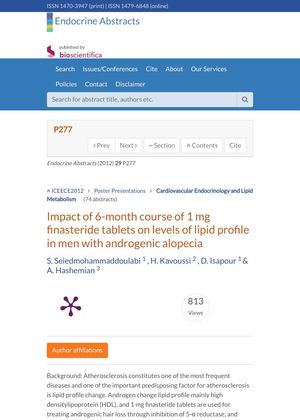 4 citations
,
July 2021 in “Journal of Dermatological Treatment”
4 citations
,
July 2021 in “Journal of Dermatological Treatment” Finasteride helps hair growth but may cause sexual side effects and depression.
November 2014 in “PharmaTutor” Finasteride may help postmenopausal women with hair loss but is not effective for all and should be used cautiously in premenopausal women.
 January 2012 in “The Year book of dermatology”
January 2012 in “The Year book of dermatology” Finasteride 5mg/day improves hair loss in normoandrogenic Asian women.
 24 citations
,
January 2010 in “Endocrine Regulations”
24 citations
,
January 2010 in “Endocrine Regulations” Taking 1mg of finasteride daily can mildly improve metabolic health and glucose regulation in men with male pattern baldness.
 18 citations
,
March 2008 in “British Journal of Dermatology”
18 citations
,
March 2008 in “British Journal of Dermatology” Finasteride works better for hair loss in patients 26 or younger.
 2 citations
,
January 2008 in “Journal of Pakistan Association of Dermatology”
2 citations
,
January 2008 in “Journal of Pakistan Association of Dermatology” Finasteride 1mg daily effectively increases hair growth and slows hair loss in men with male pattern baldness over two years.
 43 citations
,
January 2007 in “Gynecological Endocrinology”
43 citations
,
January 2007 in “Gynecological Endocrinology” Finasteride improves acne and hair loss in women with normal testosterone.
 39 citations
,
August 2004 in “International journal of gynaecology and obstetrics”
39 citations
,
August 2004 in “International journal of gynaecology and obstetrics” Finasteride and CPA-EE2 equally reduce hirsutism, but affect hormone levels differently.
 38 citations
,
June 2003 in “Journal of Investigative Dermatology Symposium Proceedings”
38 citations
,
June 2003 in “Journal of Investigative Dermatology Symposium Proceedings” Finasteride effectively improves hair growth and slows hair loss in men with male pattern baldness.
 June 2003 in “Obstetrical & Gynecological Survey”
June 2003 in “Obstetrical & Gynecological Survey” Hair loss in women can be treated with hormone therapy.
2 citations
,
February 2003 in “Obstetrical & Gynecological Survey” Most antiandrogen treatments effectively reduce acne in hyperandrogenic women, but finasteride is the least effective.
 239 citations
,
November 2000 in “Journal of The American Academy of Dermatology”
239 citations
,
November 2000 in “Journal of The American Academy of Dermatology” Finasteride doesn't effectively treat hair loss in postmenopausal women.
 10 citations
,
January 2000 in “PubMed”
10 citations
,
January 2000 in “PubMed” Both finasteride and GnRH agonist treatments reduced hair growth in women with idiopathic hirsutism, but GnRH agonist was more effective.
 65 citations
,
October 1999 in “Journal of The American Academy of Dermatology”
65 citations
,
October 1999 in “Journal of The American Academy of Dermatology” Finasteride effectively reduces hair loss by decreasing androgen levels.
September 1999 in “PubMed” Finasteride effectively thickens hair in men with minimal side effects.
 27 citations
,
November 1998 in “Journal of Endocrinological Investigation”
27 citations
,
November 1998 in “Journal of Endocrinological Investigation” Finasteride significantly reduces hair growth in women with idiopathic hirsutism.
 1 citations
,
October 1997 in “PubMed”
1 citations
,
October 1997 in “PubMed” Finasteride and flutamide can effectively treat hirsutism, with abdominal hairs showing the most sensitivity to the treatment.
 59 citations
,
September 1994 in “The Journal of Clinical Endocrinology and Metabolism”
59 citations
,
September 1994 in “The Journal of Clinical Endocrinology and Metabolism” Finasteride reduces scalp DHT levels, potentially treating male pattern baldness.
















